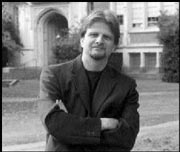SEATTLE COMPOSERS SALON
Seattle Mennonite Church, 3120 N.E. 125th 548-0981, $5 donation 8 p.m. Fri., Dec. 7
THOUGH A TEACHER can be an invaluable source for practical advice, composition is essentially a learn-by- doing activity—a process that continues throughout a composer’s entire life, every time she enters a studio, every time his marks on paper are translated into actual sound. You listen to your work, you figure out what works the way you intended and what doesn’t, and you store up the lessons for the future.
Seattle composers Tom Baker and Christian Asplund wanted simply to provide colleagues with a time and place to do this—to hear their own music performed live and to get feedback from others—so in the summer of 1999 they founded the Seattle Composers Salon. Salons are held semiregularly, usually on the last Friday of every other month, at the Seattle Mennonite Church, a remodeled movie theater that offers great acoustics, a fine grand piano, and an intimate atmosphere.
Dialogue is as much a part of a salon as the musical performances. Following each piece on the program—introduced, and often played by the composers—is a Q&A, and discussions often continue into intermission and afterward. Feedback comes not only from other composers but from audience members of all levels of new-music familiarity. “There are no dumb questions” is very much the salon’s guiding principle—but there are difficult ones.
I’ve attended all but two salons, often as composer or performer, and have found the most straightforward questions to be the most challenging to answer. “Where do your ideas come from?” “What are your musical influences?” Sometimes I’m ready to talk about a particular extramusical stimulus, or to admit from what other composers I was stealing ideas. But other times, questions come from surprising angles—someone will ask about the expressive content of a piece I thought was all about form, or vice versa, which leads me to step back and try to figure out why they heard something different than I did and why I wasn’t able to make my artistic priorities more apparent. Such questions stimulate self-awareness, which makes anyone a better composer—i.e., more proficient at making your music come out the way you want it to.
Baker does a great job of drawing everyone out. “It’s an unalienating way to listen to new music,” he adds, and the salons also give nonmusicians a peek into a composer’s brain. Writing, drawing, and even a bit of dance here and there are part of everyone’s school experience, but not everyone’s had a taste of composition, and the act is surrounded by mystery. The salon discussions help clear this up, and contemporary music novices (there have always been some in attendance) come away feeling a bit less intimidated (they’ve said so).
Another thing that makes the salons vital to Seattle’s new-music scene is their musical catholicity. Baker’s adamant about a hands-off programming policy; there’s no committee deciding what works are or aren’t worthy of inclusion, and thus no aesthetic party line. Composers of every inclination and from both inside and outside academia can expect a respectful hearing, and a good grilling afterward. The salon’s an open-mike night; composers are responsible for finding players for their own pieces and scheduling their own rehearsals. Whenever a composer has something ready to go, he or she can contact Baker (tbaker@drizzle.com) to reserve a place on the next program.
Participating composers have included both students getting their first taste of public performance and established local names like Jo묭Fran篩s Durand, Janice Giteck, and Stuart Dempster. Recent salons have included everything from traditionally tonal piano miniatures to electro-acoustic noise collages, from performance art/dance pieces to an excerpt from a “teen opera” based on the classic Spider Man comics. The Dec. 7 concert will include, among others, a work of Baker’s own—Eleven for electric guitar, played by Michael Nicolella—and a new piece by “sonic saboteur” Christopher DeLaurenti.







